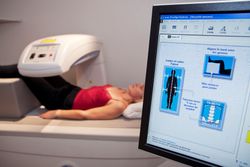
Bone loss, also known as osteoporosis, is a serious issue for many people as they grow older. Insufficient bone density leaves you more vulnerable to fractures, as the bones become more brittle and prone to breakage even without a great amount of force implied. Along with undergoing bone density testing, you should also understand why bone loss occurs and how it can be prevented. Below, find out why bone density decreases over time.
Why Bones Become Less Dense Over Time
 The natural aging process can have an impact on the development of healthy bone tissue, which in turn leads to osteoporosis. While this condition is normally associated with women, men can also experience bone loss due to their age. This occurs because the bones are less effective at retaining calcium, which is reabsorbed into your body. If you are noticing signs of osteoporosis, consult a professional for a bone density testing.
The natural aging process can have an impact on the development of healthy bone tissue, which in turn leads to osteoporosis. While this condition is normally associated with women, men can also experience bone loss due to their age. This occurs because the bones are less effective at retaining calcium, which is reabsorbed into your body. If you are noticing signs of osteoporosis, consult a professional for a bone density testing.
Your diet also has an impact on your bones. Dairy products, certain types of fish, and leafy green vegetables are all great sources of calcium. If your diet is lacking these foods, you could experience brittle bones in the future. Heavy smokers and people who excessively drink alcohol can also have impacted bone health. People with chronic medical conditions, such as rheumatoid arthritis, can also be affected.
What You Can Do to Keep Your Bones Strong & Healthy
You can get an idea of your current bone health by undergoing bone density testing, which is a test that detects for porous areas in tissue. In addition, add more calcium-rich foods to your diet and increase your intake of vitamin D to improve calcium absorption. If you smoke or drink alcohol frequently, now is a good time to cut back.
Exercise can also have a positive impact on your bones. For the greatest benefit, focus on weight-bearing exercises, which help regenerate healthy bone to make up for the loss of bone tissue. This includes activities like running, walking, and yoga.
Main Street Radiology can help you understand your osteoporosis risk by providing bone density testing. They’ve provided this and other diagnostic services to Queens’ residents for more than five decades, including MRIs, mammograms, biopsies, virtual colonoscopies, and digital X-rays. Along with their state-of-the-art technology, they also go above and beyond to ensure that patients are comfortable when performing procedures. Call (718) 428-1500 today to schedule a test or visit the website to see the complete listing of procedures.
About the Business
(139 reviews)
Have a question? Ask the experts!
Send your question

